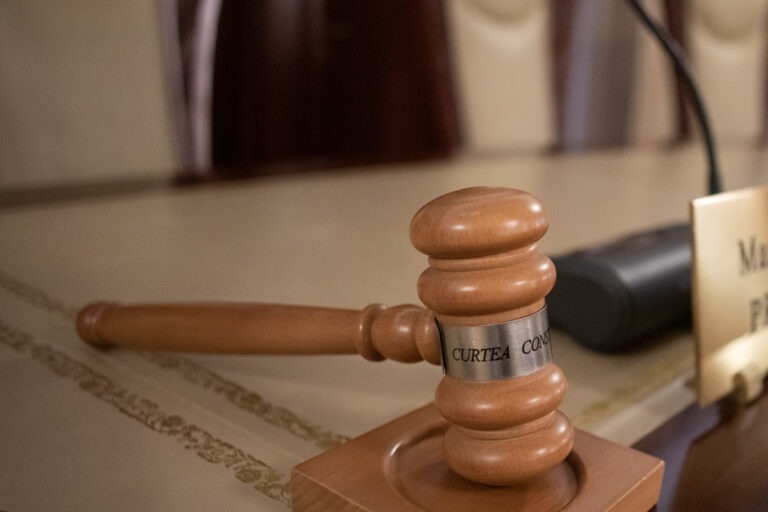
Mechanism to control the use of secret service recordings in criminal cases declared unconstitutional / Constitutional Court: „The legislator did not regulate an effective control of the elements related to the legality of the recordings” / Elimination of the threshold for abuse of office is constitutional
The Constitutional Court ruled on Wednesday that the control mechanism established by the law voted by the PSD-PNL-UDMR majority for the use of secret service intercepts in criminal cases is unconstitutional, stressing that „the legislator did not regulate an effective control of the elements related to the legality of the recordings”. The CCR also ruled that the removal of the threshold for abuse of office is constitutional.
Urmărește cele mai noi producții video G4Media
- articolul continuă mai jos -
The Constitutional Court debated the petitions on the amendments voted in Parliament to the Criminal Code and the Code of Criminal Procedure.
„The Court found that the legislator did not regulate an effective control of the elements related to the legality of recordings – evidence in criminal proceedings – resulting from specific activities of gathering information involving the restriction of the exercise of fundamental human rights or freedoms, carried out in compliance with legal provisions, authorized under Law No 51/1991, with consequences in terms of respect for free access to justice and the right to a fair trial.”
At the same time, the Court found that the legislature must regulate, in the Code of Criminal Procedure, a form of a posteriori control in the case of recordings resulting from specific intelligence-gathering activities, which are communicated to the criminal prosecution authorities and which acquire the status of evidence in criminal proceedings in which no committal for trial has been ordered, so that the person concerned by these activities, who has not become a party to the case, and the defendant against whom the prosecution has been discontinued or the case has been closed may challenge the legality of these recordings and the legality of the evidence. The Court also found that the legislature is obliged to regulate the procedure for the preservation and/or destruction of these recordings,” reads the press release issued by the Constitutional Court following Wednesday’s hearing.
Background. The laws to amend the Criminal Code and the Code of Criminal Procedure have been challenged at the Constitutional Court by MPs from the Forta Dreptei (the force of the right – e.n.), PSD and AUR, as well as by the High Court of Cassation and Justice and the Ombudsman.
The contested provisions essentially concerned:
- the non-existence of a value threshold for the offence of abuse of office
- the lack of a mechanism for challenging SRI interceptions of files
- the obligation for the parties in the cases to have lawyers with ORNISS certificates to have access to evidence obtained by the SRI which is classified
MP Ludovic Orban said on 12 April that the Forta Dreptei MPs, non-affiliated MPs and AUR MPs will challenge the amendments to the Criminal Procedure Code made in the Chamber of Deputies at the Constitutional Court.
„We consider two provisions of the Criminal Procedure Code amended by the parliamentary majority to be deeply unconstitutional, undemocratic and against the individual rights and freedoms of Romanian citizens. It is about the acceptance as evidence of interceptions made by intelligence services on national security warrants, in all types of trials for crimes that are covered by Article 139,” Orban said at the Palace of Parliament.
He noted that the second reason for unconstitutionality in the case of the Criminal Procedure Code is the article „which limits the citizens’ right to defence” and which obliges Romanian citizens to use lawyers who have ORNISS certification (security clearance – e.n.) when it comes to trials concerning national security.
„This is an aberration. The granting of ORNISS certificates is done by a state institution that can grant ORNISS certificates to whoever it wants and whoever it doesn’t want. By preventing the person who is in the course of a trial from choosing the lawyer he or she wants, the exercise of the constitutional right to defense, which is conferred to any Romanian citizen, is prevented,” he said.
The High Court of Cassation and Justice has also unanimously decided to refer the two codes to the Court.
On April the 5th, the Parliament adopted the Criminal Code and the Code of Criminal Procedure, after the Legal Committee of the Chamber of Deputies accepted, without amendments, the forms submitted by the Government.
The vote in the Legal Affairs Committee came after a break of a few minutes, during which committee chair Laura Vicol (PSD) was called to her office for „an emergency”. When she returned to the committee, she announced a change in the Coalition’s position and a return to the Government’s version.
The new codes were adopted without debate, in an unprecedented procedure that USR MEPs warned would be unconstitutional.

Donează lunar pentru susținerea proiectului G4Media
Donează suma dorită pentru susținerea proiectului G4Media
CONT LEI: RO89RZBR0000060019874867
Deschis la Raiffeisen Bank





